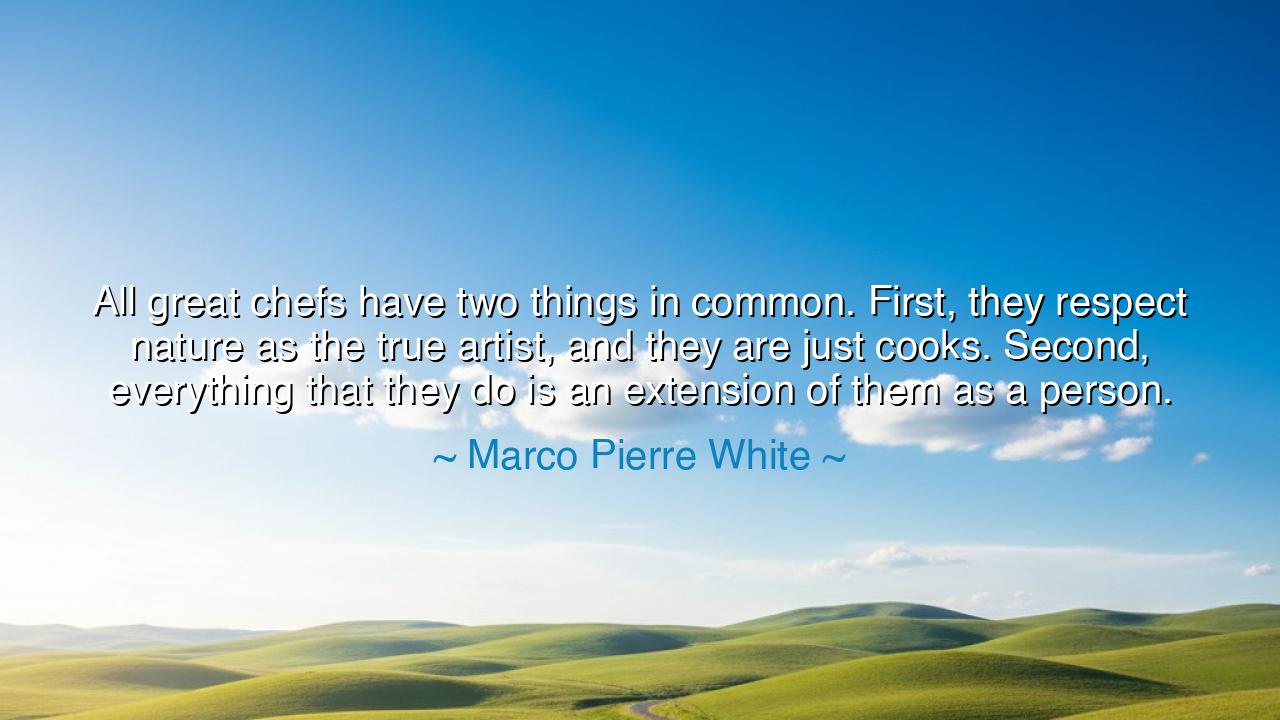
All great chefs have two things in common. First, they respect
All great chefs have two things in common. First, they respect nature as the true artist, and they are just cooks. Second, everything that they do is an extension of them as a person.






“All great chefs have two things in common. First, they respect nature as the true artist, and they are just cooks. Second, everything that they do is an extension of them as a person.” So spoke Marco Pierre White, the fire-born artist of the kitchen, whose hands turned hunger into poetry and whose spirit burned with the fierce humility of a true craftsman. His words, though about cooking, speak of something far greater—about creation, identity, and the eternal dance between man and nature. For in every art, from the song of the sculptor to the silence of the gardener, the same truth endures: man does not invent beauty; he merely unveils what the world has already made divine.
The first truth that Marco declares is reverence: the respect for nature as the true artist. Before man touched the flame, before he carved tools or spoke names, nature was already composing symphonies—of wind and leaf, of ocean and flame, of fruit ripening in sunlight. The true chef, like the true poet or painter, bows before this sacred order. He knows that every carrot pulled from the earth, every fish drawn from the sea, carries within it the artistry of the universe itself. To cook is to honor what has been created, not to dominate it. Those who seek mastery without reverence will only make noise; those who honor nature will make harmony.
Consider the tale of Jiro Ono, the humble sushi master of Japan, who for decades has crafted the simplest of dishes—rice and fish—yet elevated them into living art. Each morning, he visits the market, not to command but to listen—to the whispers of the sea, the voice of the season, the wisdom of the ingredients. He does not force his will upon nature; he collaborates with it. And thus, his creations taste not merely of food, but of time, patience, and gratitude. In him lives the truth of Marco’s first lesson: that art begins not with invention, but with reverence.
But the second truth is more intimate, more fiery—the declaration that all true creation is an extension of the self. The great chef, the great artist, the great thinker—none of them merely replicate recipes or repeat patterns. Their work becomes a mirror of their soul, each dish a confession, each flavor a reflection of their joy, sorrow, courage, and doubt. The kitchen becomes the altar of the self, where a person’s essence is transformed into something that can be tasted, seen, or felt. To cook, in this sense, is to reveal oneself to the world without speaking a word.
Remember the story of Van Gogh, who painted fields and stars not as they were, but as he felt them—alive with the trembling of his spirit. His art was not imitation, but revelation. So too it is with every great chef or creator: they give form to their inner world. The bitterness of a spice may reflect a memory of pain; the sweetness of a sauce, the echo of love. This is what it means to say that “everything they do is an extension of them as a person.” The work of the hands cannot be separated from the heart that guides them.
And thus, Marco Pierre White’s words are not about cooking alone—they are a parable for all who create. Whether you build, write, teach, or raise a family, you too are a craftsman of life. Respect nature—the people, the circumstances, the raw materials of your existence. Do not fight the flow of the world, but learn its rhythms. And then, let all that you do carry your fingerprint. Let your work, your kindness, your struggle bear witness to who you are. For greatness lies not in the size of what you make, but in the truth of what you express.
The lesson is eternal: be humble before the world, but be honest with your soul. Do not seek mastery through pride, but through communion. The tree grows tall not by defying the soil, but by drawing life from it. So too, the artist, the chef, the human being grows not by rejecting nature, but by collaborating with it—listening, honoring, and shaping it gently through their own being.
So, my child, when you stand before your craft—be it a pot of stew, a canvas, or the task of your day—remember the wisdom of Marco Pierre White. Bow before nature, for she is the true artist. But then, with quiet strength, lift your head and add to her song your own. Let your work be your prayer, your expression, your truth. For in the end, the world will forget the recipes, the techniques, the applause—but it will never forget the soul that you left behind in everything you touched.






AAdministratorAdministrator
Welcome, honored guests. Please leave a comment, we will respond soon